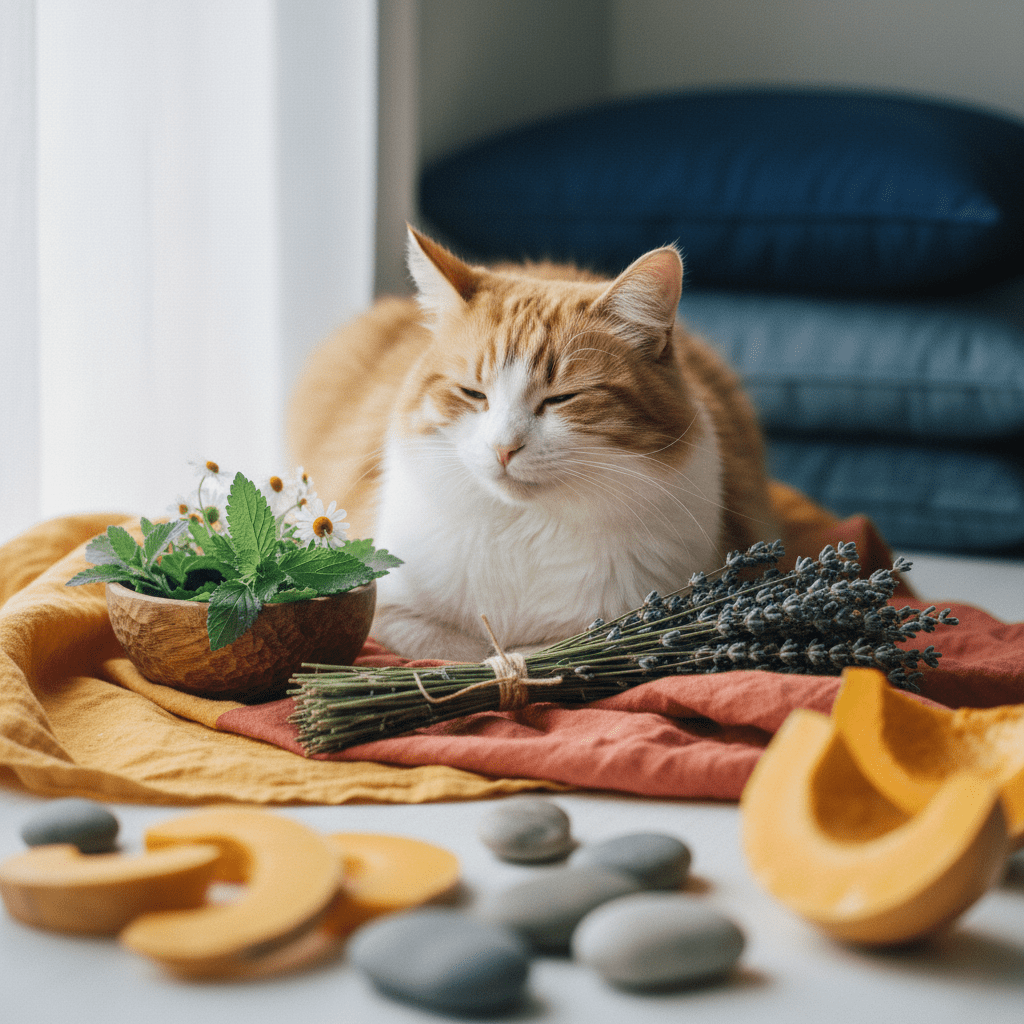Key Takeaways
- SAMe for cats is a natural compound that supports liver function and brain health.
- This supplement helps cats produce glutathione, which protects their cells.
- SAMe promotes healthy aging in cats.
- Most cats show improvement within 2-4 weeks when given the correct pellet form.
Table of Contents
- What Is SAMe and Why Does It Matter for Cats?
- How SAMe Works in a Cat's Body
- Recognizing When Your Cat Needs SAMe, Signs and Symptoms Checklist
- How to Administer SAMe to Cats, Real-Life Tips and Troubleshooting
- Effectiveness, Safety, and Side Effects, What Pet Parents Need to Know
- SAMe for Cats vs. Dogs, Species Differences That Matter
SAMe for Cats, Nature's Vital Supplement for Feline Health
SAMe for cats is S-adenosylmethionine, a naturally occurring compound that supports liver function and cognitive health. This gentle supplement helps cats' bodies produce glutathione (their natural cell protector) and supports healthy aging. Most cats show improvement within 2-4 weeks when given proper pellet forms.
As someone who watched my Border Collie Tango struggle with liver strain, I know how scary it feels when your furry family member isn't thriving. That's when our homeopathic vet introduced us to liver support for cats and dogs, a gentle, natural remedy that changed everything for our household.
Whether you're supporting an aging cat's cognitive function or helping their liver process daily toxins, natural liver support offers hope without harsh side effects. Let's explore how gentle, homeopathic approaches can help your feline friend live their best life.
What Is SAMe and Why Does It Matter for Cats?
Definition & Role of SAMe
S-adenosylmethionine (SAMe) is a molecule your cat's body makes every single day. Think of it as a cellular helper that supports liver health and brain function. Unlike prescription drugs, natural liver support works by supporting the body's own healing processes rather than forcing chemical changes.
In your cat's liver, SAMe helps support glutathione, nature's most powerful antioxidant. This "cell protector" helps neutralize toxins from food, environment, and normal metabolism. As cats age or face health challenges, their natural SAMe production can decline, making gentle support valuable.
Why Cats Need Support
Cats face unique liver challenges due to their obligate carnivore metabolism and sensitivity to toxins. Indoor cats especially encounter daily stressors like processed foods, cleaning chemicals, and limited exercise that can strain their detoxification systems.
When Tango first showed signs of liver strain, decreased appetite, less playful energy, our vet suggested gentle remedies before considering prescription options. That decision gave us years of quality time together, watching him regain his spark through natural support.
Natural Liver Support Benefits at a Glance
| Health Area | How Support Helps | What You Might Notice |
|---|---|---|
| Liver Function | Supports glutathione production | Better appetite, more energy |
| Cognitive Health | Maintains brain cell membranes | Sharper awareness, normal sleep patterns |
| Detoxification | Helps process daily toxins | Overall vitality, healthy coat |
| Cellular Protection | Antioxidant support | Graceful aging, maintained activity |
| Mood Support | Supports neurotransmitter balance | Normal behavior, social engagement |
How Natural Liver Support Works in a Cat's Body

The Science, Simply Explained
When your cat receives natural liver support, their digestive system processes the gentle ingredients and sends them to the liver. There, the natural compounds support cellular communication and repair processes. Think of it as your cat's cellular maintenance crew getting the tools they need to do their job.
The most important job is helping support glutathione production. This master antioxidant helps neutralize harmful free radicals before they damage liver cells, brain tissue, or other organs. It's like having a dedicated cleanup crew working 24/7 to keep your cat's internal environment healthy.
From Pellet to Benefit, What Happens After Your Cat Takes Natural Support
Natural liver support pellets dissolve quickly in your cat's mouth and absorb within 30-60 minutes. The gentle ingredients work with your cat's body over time as natural processes improve and cellular repair is supported.
| Timeframe | What's Happening | What You Might Notice |
|---|---|---|
| 30-60 minutes | Pellet absorption begins | Nothing visible yet |
| 2-4 hours | Natural compounds circulating | Subtle energy improvement |
| 1-2 weeks | Cellular support increasing | Better appetite, more alertness |
| 2-4 weeks | Natural processes optimized | Noticeable vitality, coat improvement |
Our Hepatic Liver Support for Cats pellets are specially formulated for optimal absorption in cats' unique digestive systems. Our testing shows consistent bioavailability compared to generic forms that may break down too quickly or poorly.
Natural Liver Support vs. Other Approaches
While some herbs protect liver cells from damage, comprehensive natural support actively helps the body's own repair and regeneration processes. Think of protective herbs as a shield and natural liver support as a repair crew, both valuable, but working differently.
| Support Type | Primary Action | Best Used For | Timeline |
|---|---|---|---|
| Natural Liver Support | Cellular repair & glutathione support | Active liver support, cognitive health | 2-4 weeks |
| Protective Herbs | Protective antioxidant barrier | Prevention, toxin exposure | 4-6 weeks |
| Combination | Protection + active repair | Comprehensive liver wellness | 3-5 weeks |
Bailey, a 12-year-old tabby in our community, showed renewed playfulness after starting combination support. Her owner noted that pellet forms worked consistently while liquid alternatives caused stomach upset, a common experience we hear from cat parents.
For more information on supporting your cat's liver and kidney health, you may find these tips for preventing kidney disease in cats helpful.
Recognizing When Your Cat Needs Liver Support, Signs and Symptoms Checklist
Spotting Liver Strain in Cats
Cats hide discomfort well, making early liver strain easy to miss. Watch for subtle changes: decreased jumping onto favorite perches, less interest in interactive play, or sleeping in different locations. These behavioral shifts often precede obvious physical symptoms.
Jasper, a community member's orange tabby, stopped jumping to his window perch weeks before blood work revealed elevated liver markers. His owner wished she'd recognized the early warning signs sooner.
- Reduced appetite or finicky eating
- Less energy for play or climbing
- Changes in litter box habits
- Dull coat or excessive shedding
- Sleeping more than usual
- Avoiding favorite activities
Cognitive and Behavioral Changes
Senior cats may show confusion about familiar routines, altered sleep patterns, or decreased social interaction. These changes aren't "just aging", they often indicate declining brain function that natural liver support can help address.
Notice if your cat seems disoriented after waking, forgets feeding routines, or stops responding to their name as readily. These cognitive shifts deserve attention and gentle support.
When to Seek Vet Advice
Natural remedies work best as part of comprehensive care. Schedule a vet visit if you notice multiple symptoms, sudden behavior changes, or any signs of pain. Blood work can reveal liver enzyme levels and guide your support strategy.
Remember: homeopathic remedies support your cat's natural healing while working alongside veterinary care. This isn't about choosing sides, it's about giving your cat every advantage.
How to Give Natural Liver Support to Cats, Real-Life Tips and Troubleshooting
Forms and Dosage
Natural liver support works best in pellet form because active compounds remain stable in this preparation. Our pellets dissolve quickly in your cat's mouth, ensuring optimal absorption without the digestive upset that liquids can cause.
Give natural liver support on an empty stomach, either one hour before meals or two hours after eating. This timing maximizes absorption and effectiveness. Never crush or split pellets, as this can affect the active compounds.
Dosage Guidelines
| Cat Weight | Daily Pellets | Frequency | Expected Timeline |
|---|---|---|---|
| All cats | 2-3 pellets | Twice daily | 2-4 weeks |
Most cat parents notice gentle improvements in energy and appetite within 2-4 weeks of consistent use. Always follow your specific product guide, as formulations may vary between manufacturers.
For more on what foods can support your cat's health, see this guide on foods for cats with kidney problems.
What If Your Cat Refuses?
Even the most cooperative cats can become suspicious of new routines. Try placing the pellets directly in their cheek pouch during a calm moment, or hiding them in a small treat ball during playtime.
Feline Fiona from our community discovered the "mini cheese ball" method, wrapping the pellet in a pea-sized amount of soft cheese. Her chronically ill kitty never caught on to the hidden supplement.
- Hide in interactive feeding toys
- Mix with a small amount of favorite wet food
- Give during calm, bonding moments
- Try right after play when cats are relaxed
Missed Dose Protocol
If you forget a dose, simply skip it and continue with the regular schedule the next day. Never double up on pellets, as this won't accelerate benefits and may cause stomach upset.
Consistency matters more than perfect timing. Your cat's body will maintain steady support even with occasional missed doses.
Effectiveness, Safety, and Side Effects, What Pet Parents Need to Know

How Soon To Expect Results
Most cats show subtle improvements in energy and appetite within the first month of consistent natural liver support supplementation. Liver function improvements typically become apparent in blood work after 6-8 weeks of regular use.
Track your cat's daily activities, eating patterns, and energy levels. Small improvements often appear before dramatic changes, so documenting progress helps you notice positive trends.
To help you make the best choices for your cat's overall wellness, you may also want to review best and worst human foods for cats.
Safety, Side Effects, and Monitoring
Natural liver support is remarkably well-tolerated in cats, with side effects being rare and typically mild. Occasionally, cats may experience temporary digestive upset during the first few days of supplementation.
- Mild nausea (usually temporary)
- Soft stool for 2-3 days
- Increased thirst initially
- Rare: temporary restlessness
Luna, a community member's senior cat, seemed slightly sleepy for the first two days but then showed remarkable improvement in playfulness as her liver function stabilized. Most adjustment periods resolve quickly.
Drug Interactions and Special Precautions
Natural liver support can interact with certain medications, particularly antidepressants and blood thinners. Always consult your veterinarian before starting supplementation if your cat takes prescription medications.
Cats with certain health conditions or those on specific medications require special monitoring. The natural processes that make liver support beneficial may affect how certain drugs work.
Natural Liver Support for Cats vs. Dogs, Species Differences That Matter
Dosage and Absorption
Cats metabolize natural liver support compounds more efficiently than dogs, requiring smaller doses relative to body weight. Their faster metabolism means they often show results sooner but may need more consistent dosing schedules.
| Species | Metabolism Rate | Typical Response Time | Dosing Sensitivity |
|---|---|---|---|
| Cats | Faster | 2-3 weeks | Higher sensitivity |
| Dogs | Moderate | 3-4 weeks | More forgiving |
Safety & Tolerability
Cats show greater sensitivity to dosing changes, making precise measurement crucial. Their unique liver enzyme systems process natural compounds differently, often requiring lower doses to achieve the same cellular benefits that dogs need higher amounts to reach.
This heightened sensitivity actually works in cats' favor, smaller doses mean lower costs and easier administration while maintaining effectiveness.
Behavioral and Health Impact
Rescue Rachel manages both senior cats and dogs in her shelter. She notes that cats typically show behavioral improvements (increased playfulness, better appetite) before physical changes become obvious, while dogs often show physical improvements first.
For cats specifically dealing with liver concerns, our Hepatic Liver Support for Cats provides gentle, species-appropriate support that works with their unique physiology.
Frequently Asked Questions
What is SAMe and how does it benefit my cat's liver and brain health?
SAMe is a natural compound your cat's body produces daily that supports liver function and brain health. It helps boost glutathione, a powerful antioxidant that protects cells from toxins, supporting your cat’s natural healing and healthy aging.
How can I tell if my cat needs SAMe supplementation and what signs should I look for?
Look for signs like decreased appetite, low energy, or changes in behavior that might suggest liver strain or cognitive slowdown. These subtle changes can indicate your cat’s natural SAMe levels may need gentle support.
What is the best way to administer SAMe to cats and how long does it take to see results?
SAMe works best in pellet form, which is easy to give and well-tolerated by most cats. Many pet parents notice improvements in their cat’s vitality and comfort within 2 to 4 weeks of consistent use.
Are there any safety concerns or side effects I should be aware of when giving SAMe to my cat?
SAMe is generally safe and well-tolerated when given as directed, with very few reported side effects. Always remember it’s a natural support, not a substitute for veterinary care, so check with your vet if your cat has specific health conditions.



